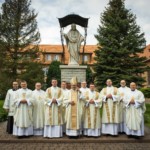The Dehonians of Northern Italy prepare for the XXIII Chapter
The various phases through which the preparation took place. The areas explored in the present situation and the prospects for the future. Expanded participation, the difficulties encountered, the questions that emerged, the proposals and a big obstacle: the pandemic. All of which are reflected in the Instrumentum laboris.
Between June 13 and 23, 2021, the Dehonian Province of Northern Italy will celebrate its thirteenth Chapter: a fundamental moment in the life of a religious province, often accompanied by great expectations, but often also celebrated with a certain amount of disillusionment and resignation. We are all aware of the growing difficulties that consecrated life experiences on a daily basis: constant aging, problems in managing structures and activities, difficulty in maintaining significant positions in the pastoral field… How can we live this moment without letting ourselves be carried away by these two powerful factors? Is there a way to avoid bouncing back and forth between illusion and disappointment?
A sui generis commission
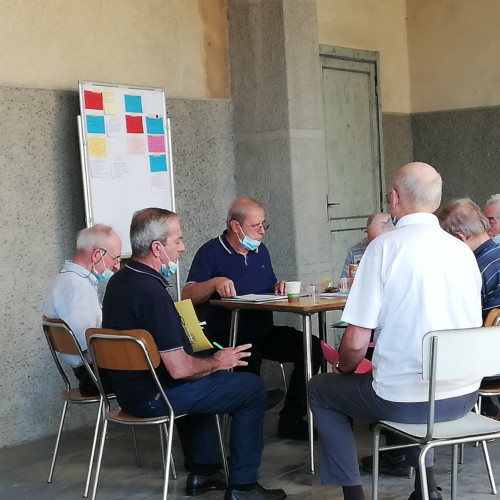 We began to ask ourselves these questions about two years ago, at the first meeting of the preparatory commission, charged with establishing the procedure for implementing the Chapter. Awareness that history has its own weight, as do relationships worn out by time and often by complicated life paths, we were led to consider the possibility of getting help from external consultants capable of offering an objective look at our reality. We felt it was essential that others help us to truly understand our experience, moving us in the direction of getting rid of any preconceived notions or evaluations excessively conditioned by univocal readings of reality. We were acquainted with a married couple, who had already had the opportunity to accompany the preparation of the assembly processes of other congregations. Getting them to become a part of our group was an idea that got us excited right from the start. From five members, our group expanded to seven: the Provincial, a former Provincial, two of the youngest members of the community, a brother with a long experience and Alberto and Eva, the married couple, rich in their experience as a couple as well as their specific skills in human resources and group management.
We began to ask ourselves these questions about two years ago, at the first meeting of the preparatory commission, charged with establishing the procedure for implementing the Chapter. Awareness that history has its own weight, as do relationships worn out by time and often by complicated life paths, we were led to consider the possibility of getting help from external consultants capable of offering an objective look at our reality. We felt it was essential that others help us to truly understand our experience, moving us in the direction of getting rid of any preconceived notions or evaluations excessively conditioned by univocal readings of reality. We were acquainted with a married couple, who had already had the opportunity to accompany the preparation of the assembly processes of other congregations. Getting them to become a part of our group was an idea that got us excited right from the start. From five members, our group expanded to seven: the Provincial, a former Provincial, two of the youngest members of the community, a brother with a long experience and Alberto and Eva, the married couple, rich in their experience as a couple as well as their specific skills in human resources and group management.
The first steps
From the very first meetings it seemed clear to us that it was necessary to start from the human reality of our Province, the real capital we have. Since we could not foresee, for canonical reasons, a Chapter which included the participation of all the members of the Province, we nevertheless felt that one of the fundamental issues should be that of the participation and involvement of all, in order to try to reduce to a minimum the pockets of indifference and self-exclusion from the planning and decision-making processes. If, therefore, it was impossible to convene a plenary meeting, there was nothing to stop us from going out to meet all our communities, with the idea of listening to every brother. So if this idea that informed our journey was to be effective, the Chapter had to begin with this listening process. With the slogan “the Chapter has already begun” we want to look to the June celebration as its concluding moment.
Excluding those persons who were part of the provincial government, past and present, we decided to divide the members of the commission into three groups without specific assignments, but using profiles best suited for the task of listening. Since it was necessary to collect material to be worked on at a later date, it was necessary to construct a homogeneous scheme for gathering information that would allow all the confreres to express themselves freely on other questions as well. At the same time, however, the meeting with the communities had to guarantee that everyone would feel at ease, in an informal atmosphere, suited for good fraternal sharing. Thanks to a good and fortuitous choice of timing, within five months and before the arrival of the Covid storm, it was possible to complete a tiring but productive round of meetings.
The first great surprise of the three visitors, promptly renamed as the “Three Kings”, was to note the good spirit of welcome exhibited by all and to see how almost all the brothers took the opportunity to meet with each other. A simple, guided method, based on three steps – analysis of the present reality, projection into the future when the Chapter shall have already taken place after six years of choices, dangers to be avoided during the celebration of the Chapter itself – gave everyone the opportunity to express their own emotional experience, but also the concrete reality of our religious Province.
Too much data, some stumbling blocks, a pandemic
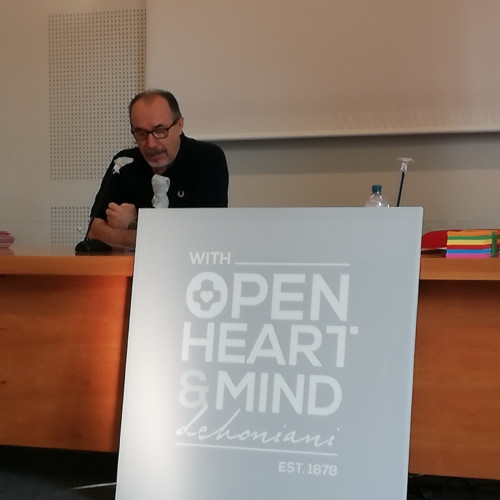 The many pages that were collected and recorded were reviewed by the three authors together and they formed the basis for the feedback. This was accompanied by graphs and summaries, capable of putting the data into everyone’s hands, so as to favor the true perception of what was heard. This material should constitute the basis on which to set up some possible discussion tables, identical in their formulation, to set a theme during the two assemblies, which would follow each other after a few weeks, in order to allow everyone to participate without emptying our communities. However, we all learned well, at our expense, how things don’t always go according to the planned schedule: the obstacle of a viral pandemic had not even been taken into account by our committee.
The many pages that were collected and recorded were reviewed by the three authors together and they formed the basis for the feedback. This was accompanied by graphs and summaries, capable of putting the data into everyone’s hands, so as to favor the true perception of what was heard. This material should constitute the basis on which to set up some possible discussion tables, identical in their formulation, to set a theme during the two assemblies, which would follow each other after a few weeks, in order to allow everyone to participate without emptying our communities. However, we all learned well, at our expense, how things don’t always go according to the planned schedule: the obstacle of a viral pandemic had not even been taken into account by our committee.
The assemblies scheduled for May had to be postponed to September, but at this point the question arose as to how to keep up the pressure with respect to the expectations set in motion by what had been done previously: the most logical path to follow seemed to be that of soliciting the reflection of our communities, through the proposal of a series of questions based on four areas: structure of government and governance, elements for a provincial project, role of the economy, spiritual legacy and formation. Each of these four areas was introduced by a brief list of reference documents that could clarify the steps taken on the topic in the life of our Province. The questions proposed were not intended to return to issues already dealt with by individuals, but sought to develop these issues to foster discussion within the community, so as to produce more material to be reworked at the fall assemblies.
The response provided by the communities made us understand the goodness of the path taken and highlighted a good level of involvement, not so much in terms of the quality of the responses, but in the fact that all the communities felt involved by our requests. The initial desire to arrive at the final phase of the Chapter with a reduced number of disgruntled and marginal members seemed to have found its first concrete expression.
Pre-Chapter Assemblies
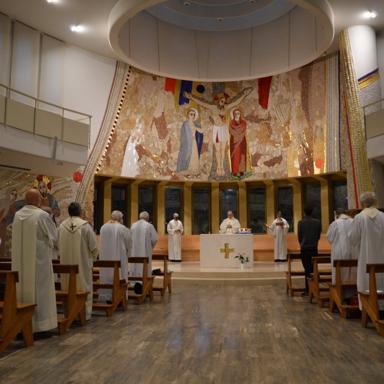 At the commission level, a third, rather complicated but decisive phase now began: it was a matter of re-working all the material collected so as to be able to get feedback in the form of delimited and clearly defined topics, useful for establishing the working platform for the assemblies.
At the commission level, a third, rather complicated but decisive phase now began: it was a matter of re-working all the material collected so as to be able to get feedback in the form of delimited and clearly defined topics, useful for establishing the working platform for the assemblies.
Of course, as some of the community feedback also suggested, it would not have been possible to avoid rereading everything in the light of the dramatic experience of the pandemic.
With the arrival of September, sanitary conditions made it possible to hold the two planned assemblies: celebrated over two days and modeled on an identical schedule, they were attended by a truly high number of confreres, considering the justified absences of the sick and infirm. Even the most elderly allowed themselves to be put out of their comfort zones so they could be involved.
The assemblies were based on an initial pact that allowed for a basic agreement on expectations and rules of engagement, but did not neglect the spiritual aspect, considering it, indeed, a fundamental part of the experience: the lectio divina on the Gospel of the day and the celebration of the Eucharist, with the addition of a few brief snippets on the theme of community (considered the red thread of all our reflections) provided a rationale for the context within which a Chapter must take shape.
The basic idea for the work which was to follow to was to reconstruct the atmosphere of a square, the classic village square, where it is possible to move from a bar to a restaurant discussing freely the proposed themes, accepting the guidance of a mediator present at each table, but with the possibility for each person to be able to give the most time and attention to those themes that they considered really important. When a person had the opportunity to share all they wanted to on a particular theme, they could move to another table in the square where they would find a brief outline of what had been previously discussed by all the participants. The seven themes proposed represented the condensation that the committee had been able to extract from all the material produced and propose from the previous months of listening, even though they were aware that, probably, some issues would come up again and again on different fronts.
The reality of the third and fourth ages, the theme of economic management, the relationship with the rest of the congregation, the question of governance structures, ongoing formation, the aspect of solidarity, and the theme of integrated pastoral care with the laity and other ecclesial realities: these were the animated points of exchange in our piazza that enjoyed, for an afternoon, the frankness of saying important things to each other in a different way. In fact, from an obvious initial embarrassment, a certain interest and willingness to accept this new method flourished. At the end of the activity, a small editorial committee for each table drew up an organic collection of all the interventions, in the form of post-it notes, left by the participants.
The seven syntheses were reworked, in a second phase, in seven new “tables of trust”, where together they drew up a concise but unanimously shared document to be submitted for the last interventions of the plenary assembly. This last phase also took into account a method that would guarantee three interventions (for a maximum of one minute) per person: the objective was to avoid leaving too much space to some, trying to favor targeted and precise interventions.
The final conclusions, before leaving each other, indicated that the method that was chosen was the right one: expressions such as an experience of fraternity, fulfilled expectations, the possibility to have good discussions together, were an added benefit of the greetings.
At present
Faced with the positive conclusion of the two assemblies, the chapter commission found itself faced with a collection of fourteen sheets (seven for each assembly) to be re-worked and interpreted with the intention of producing an Instrumentum Laboris.
With systematic precision, the arrival of autumn brought back hard times and restrictions linked to another out break of the pandemic: a time still going on, which is useful in some way for our reflection, but a time also of new and difficult challenges, a time to be taken into account as we work out a path for the future. We asked ourselves, in fact, how we should take into account all the material we had developed in light of what was happening around us and in our own communities.
Now began the phase that would lead us to the last step, the one that asked us to become not only listeners capable of faithfully taking in and holding the requests of the confreres, but also authors of a final document that would include and carry what had been acquired and had personally matured during this long journey. We thought of a thin, little document, about fifteen pages long, with an introduction capable of giving an account of the journey and of some of the things that got us excited which came to us from these difficult times. Each section has been structured in such a way as to highlight the theme, the orientations and a list of possible concrete proposals for discussion.
One objective of the Instrumentum Laboris is that it may also serve as a stimulus for further community study, in the hands of the delegates elected for the final phase of the Chapter. We have invented a sort of “augmented Instrumentum Laboris”: it is meant to be a working document and an effort that we are now entrusting to a Province that, although weighed down by years and the situation, we have recognized that it is still eager to spend itself at the service of the Kingdom.
A bet: listening in order to generate
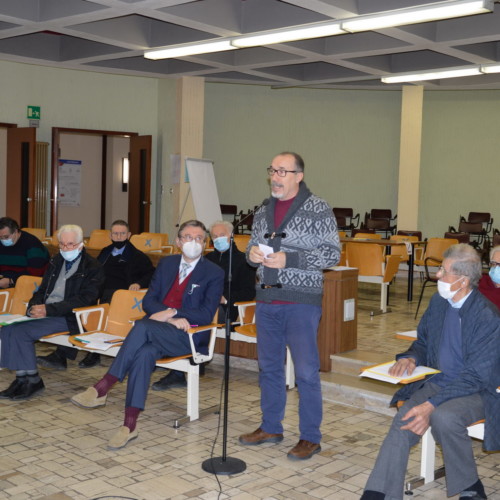 The entire process described deserves a final consideration: listening is always the best way to put back into circulation the desire to belong and the sense of fraternity, but also to reduce to a minimum the amount of mistrust and resignation that embitter part of consecrated life today: true and sincere listening can even lessen the power that the fear of death has on us. For the present, we have tried to listen to each other more, waiting to see if we have been able to truly listen, the kind of listening that can generate good and productive decisions for the future.
The entire process described deserves a final consideration: listening is always the best way to put back into circulation the desire to belong and the sense of fraternity, but also to reduce to a minimum the amount of mistrust and resignation that embitter part of consecrated life today: true and sincere listening can even lessen the power that the fear of death has on us. For the present, we have tried to listen to each other more, waiting to see if we have been able to truly listen, the kind of listening that can generate good and productive decisions for the future.
To be worthily celebrated, a Chapter needs to listen to the Word and to the words of the brothers: in this climate it will be possible to rediscover that a charism can still be the distinctive sign of belonging to Christ, the Lord of life.

SettimanaNews (WeeklyNews) is an online platform that offers religious information in the context of cultural and historical-civil confrontation. It inherits the paper magazine Weekly (1946-2015) which is characterized by its pastoral focus.
North Italian Religious Province of the Dehonians is the owner of the site.



